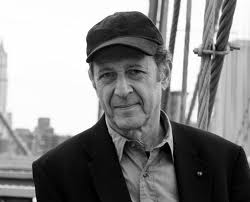main: April 2011 Archives
Composer Steve Reich, age 75, knows secrets of correlating pulsating rhythms and interlocking layers of sycopated melodic patterns which he's eager to reveal in every work he writes. His musical signature is so unwavering it might veer into self-parody, but for the vigor and commitment of his performers. At Carnegie Hall last night four energized new music ensembles poured enthusiasm, precision and a sense of discovery into four recent Reich pieces, making their Master's overlays, cycles and cells variously delightful, ominous, rockin', tense, melodramatic and exotic. Reich writes music that's both reassuring and subversive, and his 75th birthday concert at Carnegie Hall provided both in delicate yet confident balance.
balance.
 balance.
balance. Reich's music is distinctive, certainly, unlike that of any of the other composers around his age he's been linked to for their common use of repetition, or seeming repetition,and consonant harmonies (as opposed to that old atonal or 12-tone stuff). Mallet Quartet (2008) played by So Percussion, WTC 9/11 (a commissioned debut) by Kronos Quartet, 2x5 performed by Bang on a Can Allstars and Friends and Double Sextet with eighth blackbird joining the Allstars may not be Reich's deepest or most ambitious pieces, but they provide pleasures, live in the moment and make the moment live -- not easy things however smoothly the music goes down, and what we hope for from all music, though in contemporary composition we (the editorial "we") are often disappointed.
Continue reading Steve Reich @ Carnegie Hall @ 75, with devotees.
My CityArts - New York column is about the Creative Music Symposium, organized by Karl Berger, pianist/vibist with his wife Ingrid Sertso, who cofounded with free-thinking Ornette Coleman of the Creative Music Studio in Woodstock NY (1972-1984). The symposium at Columbia University's Center for Jazz Studies (directed by trombonist and digital music innovator George E. Lewis, once a CMS student/participant) last weekend dipped into the history and practices of the CMS, a paradise where cross-genre visionary improvisers (Don Cherry, Anthony Braxton, Cecil Taylor, Dave Holland, Jack DeJohnette, et al), composer/interpreters (Pauline Oliveros, Frederic Rzewski) and "world music" fusionists (Olatunji, Nana Vasconcelos) taught through oral transmission in an immersion setting.
Back in the day I wished I was musician enough to attend the Woodstock sessions, and as a budding writer was frustrated there was nowhere comparable to go -- so moderating a symposium panel felt like I got to CMS at last.
Continue reading Creative Music Studio, Woodstock at Columbia U and East Village.
The Central Brooklyn Jazz Festival, during what the Smithsonian Institution promotes as Jazz Appreciation Month, is a powerful statement of hard core, grass-roots support for the music Congress has ratified as "a rare and valuable American national treasure." My City Arts column reports on how the fest and other Brooklyn jazz activities, despite best intentions, reprise the distances and suspicions people of diverse backgrounds hold about each other.
Continue reading Central Brooklyn Jazz Fest reiterates jazz/race divide.
Morton Subotnick re-mixes original materials of his prophetic and unprecedented late '60s electronic music classic "Silver Apples of the Moon" with kinetic imagery by video artist Lillevan tonight (April 7) at the Rubenstein atrium of Lincoln Center -- as detailed in my column in City Arts - New York. It's free as part of the 11-day Unsound Festival, an extraordinary schedule of new and unusual multi-media works presented by the Fundcja Tone of Krakow with the Polish Cultural Institute in New York and the Goethe-Institute New York. Subotnick performs again tomorrow (April 8) at Greenwich House Music School (also NYC), 6 pm.
Continue reading Subotnick, Lillevan, Unsound make Lincoln Center an electric circus.
I spoke on jazz and blues at the University of Jordan, a modern 45,000-student institution, in an event sponsored by the American Embassy while in Amman on family matters a couple weeks ago. About 50 avid students of music, arts and literature and their informed faculty watched videos of Louis Armstrong at age 32 doing "Dinah," Charlie Parker & Dizzy Gillespie playing "Hot House," Billie Holiday with all-stars singing "Fine and Mellow" and Muddy Waters among other immortals from the American Folk Blues Festival, 1962-69, vol. 3. I talked about blues and jazz being one in essence, but different in practice. Then second-year Jordanian student Nabil Gonzalez played banjo, harmonic and sang two original numbers in a U.S. folkie style. "I'm passionately in love with bluegrass music!" Gonzalez told me. Other of the young people were eager for jazz and blues, but said they had little access to the music or information about it.
Continue reading Jazz, blues & beyond in Amman: Pops, Bird, Diz, Lady Day @ UJordan .